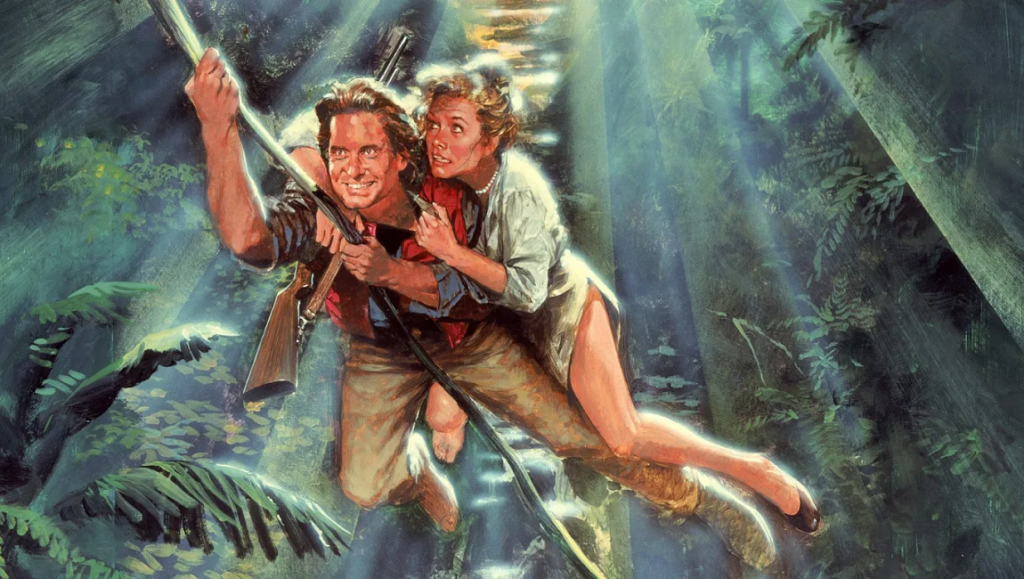Nowadays we’re saddled with tepid action comedy stuff like The Lost City or Chris Pratt and Bryce Dallas Howard’s alleged chemistry in the Jurassics World. This tossed-off, anodyne content is destined to merely wind up on some streaming service rather than actually attaining any memorability. It’s more than enough to make one long for a real romantic adventure. But even were viewers gifted a more hospitable market for storytelling than the one we’ve been suffering through for a while now, it would be an incredible feat to recreate the alchemy of 1984’s Romancing the Stone.
First, you’ve got the incredible casting of Michael Douglas and Kathleen Turner. It’s plenty enough fun on its own to watch Turner’s romance novelist Joan Wilder start out as naïve and slightly daffy and grow into the more intimidating, almost severe character we’re used to watching her play in stuff like Body Heat or Crimes of Passion (which incidentally came out only about 6 months later in the U.S.). It’s similarly a pleasure to watch the screenplay (and Turner) consistently undermine Douglas’ supposedly rugged adventurer Jack Colton, who he plays as an overconfident, occasionally even bumbling lout. Putting these two actors together, though, was a stroke of luck. In the film’s best scene, Colton and Wilder are sheltering in the wreckage of a crashed plane, burning the bricks of weed that were being smuggled on it for warmth and getting stoned out of their minds. It might as well be It Happened One Night. And all of that comes before you shove Danny DeVito into the picture as a disheveled would-be kidnapper seemingly incapable of being in the right place at the right time. Truly, these three performers fired up such legendary chemistry that pairing them together became a brief cottage industry (see also War of the Roses and this film’s misbegotten sequel, The Jewel of the Nile), and it remains something of a modern-day gold standard.
Then you’ve got this diabolically clever screenplay from first-time (and, it would turn out, only-time) writer Diane Thomas. From the delightful prologue that puts us into one of Joan’s books and introduces us to her as a character — a section that also doubles as an ingenious Raiders or Bond-ian pre-credits set piece — to the simple premise of our fish-out-of-water heroine living out one of her own stories, it’s all so economically tight, persisting as almost novel to this day in its show-don’t-tell qualities. Tragically, Thomas was killed in an auto accident a few months before the release of Jewel of the Nile — which she didn’t work on, as the studio had decided she was now too expensive to pay for. Audiences were robbed of what should have been a long career.
And finally, you’ve got newly-anointed whiz-kid Robert Zemeckis directing. Today he’s got a reputation (mistakenly, I would suggest) as a maker of saccharine crowd-pleasers overburdened with his tech preoccupations, but certainly at this point in his career, he was fully indulging in his subversive streak of humor and predilection for sudden, scary violence. Only in a Zemeckis-helmed romantic comedy would a guy get graphically eaten by an alligator at the end. But more than that, Zemeckis is always keeping the camera moving at a pace with the narrative, and you can already feel the deft hand he’d bring to the heavy conceptual and narrative (and, yes, cynically subversive) leaps he’d tackle in Back to the Future or Roger Rabbit. The studio was so convinced that Romancing the Stone would fail that they preemptively fired Zemeckis from Cocoon, and they might have even been right — he went back five months after principal photography to reshoot whole chunks of this movie after some abysmal test scores, including the aforementioned pot plane scene, and arguably saved the project. And we haven’t even mentioned legendary tech collaborators like cinematographer Dean Cundey or production designer Laurence Paull and the heavy assists they deliver. With none of these people back on board save the core cast, sequel The Jewel of the Nile was doomed to fail (even notwithstanding Thomas’ death, or the tragic plane crash that cost six crewmembers, or Turner’s lawsuit… but all that’s another story). They certainly don’t make them like they used to, but maybe now they just can’t. But Zemeckis could, he did, and Romancing the Stone remains a high-water mark of adventure rom-coms, and an instructive key to the director’s next decade of work.
Part of Robert Zemeckis: Movie Magician


Comments are closed.